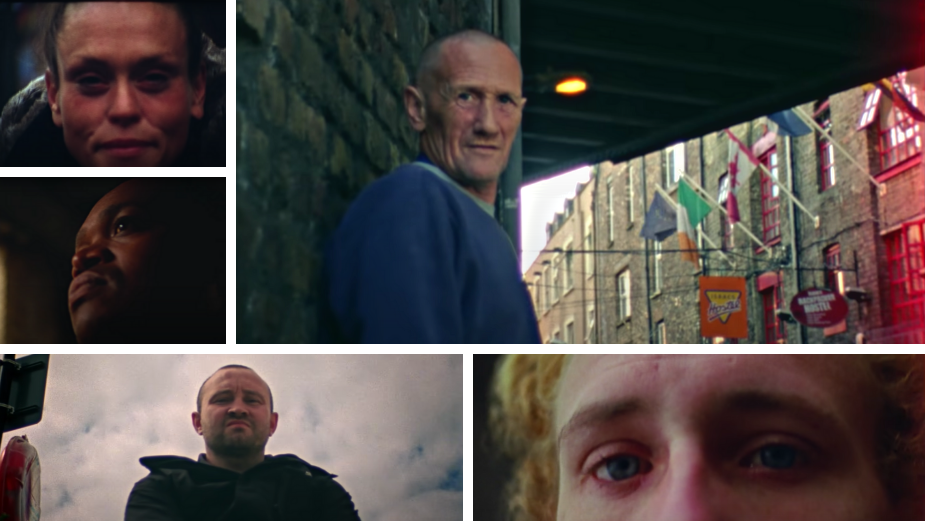
You Are Not Less - You Do Not Love Less, You Do Not Fear Less, You Are Homeless

Set against a powerful poem written by Des Kavanagh and Rob Murray, the latest spot for Dublin Simon Community, shot by Banjoman director Dermot Malone paints a raw and authentic portrait of people who have gone through / are going through homelessness. With the campaign message “U Are Not Less”, the film aims to raise awareness of the fact that homeless people are just like any of the rest of us. That even though they are homeless, that does not mean that they are less in any way. They do not love, fear, cry, laugh, want less.
In an interview with LBB, Dermot shares his experience on the most moving project he has ever worked on and uncovers how he captured such authentic and truthful portraits of the amazing people that he met along the way.
LBB> How did you get involved in the Not Less campaign for Simon and what was the brief from the client?
Dermot Malone> It happened really organically. I had been back and forth for a long time with one of the creative directors at BBDO Dublin - Des Kavanagh. We had wanted to work with each other for a while and were just waiting for the right project. I was delighted then that over the summer, Des sent us a beautiful brief, all about celebrating the humanity of homeless people and showing that just because they're homeless, it doesn't make them any less human. They don’t love less, they don't laugh less, they don't cry less - they have full lives and they're not just to be walked past. This brief was of course for their client, The Dublin Simon Community.
I instantly loved it. I love Dublin, I love the city where I live, and the homeless problem is real here. So I got straight on board.
LBB> What were your initial reactions and creative thoughts on how to approach this brief?
Dermot> I wanted it to be very photographic. A great friend of mine, Tony Kearns (Distinguished Film Editor) has been taking the most beautiful photographs, observing real people in real situations, for years. His work is very authentic, very truthful, and always centres around real moments - Instantly I knew I wanted to do something similar.
And then I'm a big fan of Martin de Thurah - he's one of my favourite directors. He did a piece for Amnesty International a few years ago, and I just really loved how he treated the subjects. I was inspired by both of the above, while also making sure to bring my own approach. I just wanted it to be utterly honest, simple and stripped back.
LBB> You shot this on 16mm film, what were the creative decisions behind this and what does it lend to the campaign?
Dermot> It's something I've always wanted to do, because it does have a very rich and different look. There has been a lot of 4:3 work in commercials recently, which I actually don’t like as I feel it can be a bit contrived or unnecessary. But this being such a photographic project, myself and DOP Luke Jacobs felt that 16mm and 4:3 would suit the film well - Our motivation was that it should look like someone just picked up a can of film and found these really authentic and truthful portraits within.
LBB> You mentioned this is the most emotionally affected you’ve felt on a shoot, can you tell us about your experience and what you felt?
Dermot> Yeah, it really was genuinely, a very eye opening experience. We were walking around, and meeting people that the guys at Simon had arranged for us to talk to. It’s all well and good making a nice film, but when you actually meet and chat with people from all walks of life who have had such tough lives, falling through the cracks of the system, it's just really, really affecting. It really moved me to think of how lucky most of us are and how we need to do more for the vulnerable in society, because it could so easily be any of us out there. Each of the individuals’ stories really affected me. I found it hard to believe that this was happening right on our doorstep to so many people.
When you're doing a commercial or film, you're obviously wholly invested, but this felt very different. Working with real people who are going through such challenging circumstances every day, who need help, was very grounding - This realisation really elevated the importance of the work. I also found myself very moved by the conversations I had with each of the guys, and their willingness to work with us was really, really humbling.
LBB> And on the creative and technical side, how did you bring this emotion out through the narrative of the film?
Dermot> The guys at BBDO had written an amazing poem which was emotional in its own right. What I wanted to do was just deliver images that were truthful, authentic and that would connect - no contrived poses, no actions, just capturing people being themselves. If they smile, they smile, if they don't, they don't. If they cry, they cry, if they ponder, they ponder.
The way to achieve that technically was just through simplicity, not trying to capture lots of different angles, lots of different shots, it was just to rest the camera on the portraits and then go through various minutes and conversations and moments. Simplicity and the technical approach was key to delivering the end result.
LBB> What was the casting experience like and how did you ensure you were telling their stories in the most authentic way?
Dermot> We worked really closely with the outreach team in the Dublin Simon Community, meeting clients of theirs who they felt might be willing to give up their time. And then we kind of just went rogue at the end of the day, asking people if they'd be willing to be a part of the film and that's where we got some of the most compelling portraits. For example, that final portrait is one of my favourites in the film. We just happened across that woman and she was really into the project, she was amazing.
LBB> What was the most challenging aspect of this project and how did you overcome this?
Dermot> It was the unknown of whether people would show up on the day or agree to be shot. But because we did a couple of walk arounds already, I was quietly confident we would get willing participants. But it was that unknown variable of what exactly we were going to encounter that was the most challenging.
LBB> Did you learn any interesting facts about homelessness in Dublin that have stuck with you or that you were unaware of before?
Dermot> I guess just the reality of the fact that this can happen to any one of us, having listened to everyones story. There were people from all walks of life and from countries all around the world. It also much be said that these aren't people who necessarily struggle with addiction issues, as can sometimes be the perception, but rather it became clear that there is no one way in which a person can become homeless. We need to do more.
LBB> What was your reaction to the finished film?
Dermot> I love it. It's one of the pieces I'm most proud of. I think it's the most authentic piece I've ever made - capturing real people with authenticity and without any artifice, creating something very truthful and real. I'm really proud of it.













